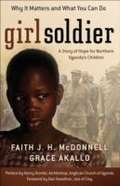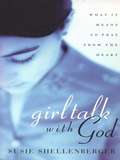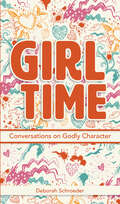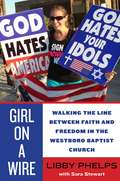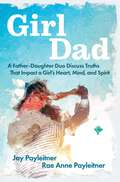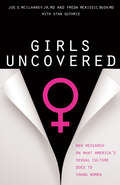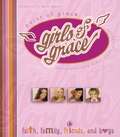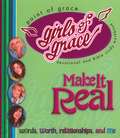- Table View
- List View
Girl Singer
by Mick Carlon"A fast-paced narrative. . . . compelling and intense reading, by turns funny, tender, and horrifying, Girl Singer is the real deal--a captivating, well-told tale." --Fred Kasten, Edward R. Murrow Award-winning journalist"Carlon is a natural heir of Robert Louis Stevenson. If you like good fiction, you'll like Girl Singer." --Brian Morton, The Penguin Guide to Jazz"Carlon is a unique educational force, bringing young readers into the pleasures and drama of jazz." --Nat Hentoff, Jazz Country, Boston Bay, etc."An arresting and wonderful story that communicates--through a deep relationship between a singer and a Holocaust survivor--the joy of music, self-discovery, pain, and racism." --Dick Golden, host of George Washington University Presents American Jazz"Avery's story tackles hard topics--racism, women's rights--which transcend time and place. A tale with deep resonance and educational force, that will keep readers turning pages." -Marilyn Lester, executive director, the Duke Ellington Center for the ArtsHarlem 1938: eighteen-year-old Avery, aspiring singer, is heard by Lester "Pres" Young, Count Basie's tenor saxophonist. Pres recommends her to Basie, and Avery is whisked into the jazz life. Years later, with several hit records to her credit, Avery settles in Greenwich Village. But her life takes a sharp turn when she meets Karl, a Jewish refugee from Hitler's Germany.Mick Carlon is a thirty-year veteran English and journalism teacher at the high and middle school levels, and the author of the middle-grade novels Riding on Duke's Train and Travels with Louis. He is a frequent contributor to Jazz Times.
Girl Soldier: A Story of Hope for Northern Uganda's Children
by Grace Akallo Dan Haseltine Faith McDonnellFor several decades a brutal army of rebels has been raiding villages in northern Uganda, kidnapping children and turning them into soldiers or wives of commanders. More than 30,000 children have been abducted over the last twenty years and forced to commit unspeakable crimes. Grace Akallo was one of these. Her story, which is the story of many Ugandan children, recounts her terrifying experience. This unforgettable book with historical background and insights from Faith McDonnell, one of the clearest voices in the church today calling for freedom and justice will inspire readers around the world to take notice, pray, and work to end this tragedy.
Girl Talk With God
by Susie ShellenbergerMost Christian teens don't know how to pray. And when they do pray, they don't know how to discern God's voice. In Girl Talk With God, author Susie Shellenberger shows teens how to pray and challenges them to deepen specific areas in their lives through a series of conversations between God and a teenage girl. As editor of Brio magazine, a Focus on the Family publication for teenage girls with a circulation of over 200,000, Shellenberger has proven a keen ability to reach this often-misunderstood age group with her signature blend of casual, non-threatening teaching.
Girl Talk: 52 Weekly Devotions
by Lois Walfrid JohnsonA Faithgirlz Guide to Life By middle school, a lot of new, sometimes strange, things start to happen, and it can be overwhelming. You have new responsibilities, new opportunities, and a whole new set of problems, and sometimes it can feel like no one but you can understand what it’s like to be you. Well, you’re not alone. This one-year devotional is filled with stories about girls who feel just like you, and who are going through things like embarrassing moments in front of friends, putting up with mean girls at school, having a huge crush on that cute boy, or just dealing with what it’s like to become a young woman. As you read their stories each week, and fill in questions about how you think each girl should react, you’ll learn new ways to deal with the pressures around you. Through prayer and journal exercises, you’ll also discover there is someone out there who knows exactly how you feel. And he’s more than ready to listen.
Girl Time: Conversations on Godly Character
by Deborah SchroederAre you a Christian mom looking for ways to have honest, heartfelt conversations about godly character with your daughter?For Deborah Schroeder, answers were in the breakfast aisle. It's not the first place you'd expect to find ideas, but inspiration is often found in life's ordinary moments. Things are not always as they seem. Everyday places and situations—even time spent in the breakfast aisle—often teach important lessons, and that's exactly what Girl Time reveals. In a world fixated on appearances, it takes the effort of looking past the exterior and trusting God's guidance to learn what godly character is and how you can find and share it with others.Often thoughtful and profound, filled with personal anecdotes and humorous stories, this Bible study book is a tool for mothers and mentors teaching godly character to daughters, granddaughters, and the next generation of godly women.Girl Time will help you foster conversations on godly character, share the wisdom you've learned from your unique experiences, and grow together in God's Word in fun and meaningful ways! This study also includes helpful suggestions for use in various group settings.
Girl Unwrapped
by Gabriella GoligerToni Goldblatt's awakening to forbidden desire in 1960s Montreal conflicts with the expectations of her Holocaust-scarred parents; she flees to Israel in an attempt to reinvent herself, but the Zionist dream doesn't save her. Only on her return home, where she discovers kindred spirits in the underground lesbian scene, does Toni begin the accept the truth about herself.
Girl at the End of the World: My Escape from Fundamentalism in Search of Faith with a Future
by Elizabeth EstherI was raised in a homegrown, fundamentalist Christian group--which is just a shorthand way of saying I'm classically trained in apocalyptic stockpiling, street preaching, and the King James Version of the Bible. I know hundreds of obscure nineteenth-century hymns by heart and have such razor sharp "modesty vision" that I can spot a miniskirt a mile away.Verily, verily I say unto thee, none of these highly specialized skills ever got me a job, but at least I'm all set for the end of the world. Selah. A story of mind control, the Apocalypse, and modest attire.Elizabeth Esther grew up in love with Jesus but in fear of daily spankings (to "break her will"). Trained in her family-run church to confess sins real and imagined, she knew her parents loved her and God probably hated her. Not until she was grown and married did she find the courage to attempt the unthinkable. To leave.In her memoir, readers will recognize questions every believer faces: When is spiritual zeal a gift, and when is it a trap? What happens when a pastor holds unchecked sway over his followers? And how can we leave behind the harm inflicted in the name of God without losing God in the process?By turns hilarious and heartbreaking, Girl at the End of the World is a story of the lingering effects of spiritual abuse and the growing hope that God can still be good when His people fail. Includes reading group discussion guide and interview with the authorFrom the Trade Paperback edition.
Girl in a Bad Place
by Kaitlin WardThe Haven, a commune in the mountains, seems harmless -- until Mailee's best friend Cara decides she's going to stay there forever. How far will Mailee go to bring her friend home?Mailee and Cara take care of each other. Mailee is the star of the high school plays; Cara is the stage manager. Mailee can't keep her life together; Cara has enough organizational skills for the both of them.So when the girls are invited to visit the Haven, a commune in the mountains near their suburban Montana homes, it seems like an adventure. Until Cara starts spending every waking minute there ... and Mailee thinks it's creepy, almost like a cult. When Cara decides she's going to move to the Haven permanently, Mailee knows it's a bad idea. But how far will she go to save her best friend ... from herself?
Girl on a Wire: Walking the Line Between Faith and Freedom in the Westboro Baptist Church
by Libby Phelps Sara StewartIt wasn’t until Libby Phelps was an adult, a twenty-five year old, that she escaped the Westboro Baptist Church. She is the granddaughter of its founder, Fred Phelps, and when she left, the church and its values were all she’d known. She didn’t tell her family she was leaving. It happened in just a few minutes; she ran into her house, grabbed a bag, and fled. No goodbyes. Based in Topeka, Kansas, the Westboro Baptist Church community is one the country’s most notorious evangelical groups. Its members are known for their boisterous picketing—their zealous members with anti-military, anti-Semitic, and anti-gay signs—“Thank God for Dead Soldiers,” “God Hates Jews,” or “Thank God for 9/11”—and their notorious catchphrase “God hates fags.” Search for them online and you’re directed to their website, www.godhatesfags.com.The church makes headlines in news across the country. You’ve driven past its picketers or seen them on TV. It has seventy members and ninety percent of them are part of Libby’s family. They picket concerts, football games, other churches, and, most notoriously, the funerals of servicemen and victims of hate crimes. For its members, to question its rules is to risk going to hell—where worms eat at your body and fire shoots out of your eyeballs. In Girl on a Wire, Libby is candid about her experience and what’s happened since her escape. On Anderson Cooper Live, she was confronted by the mother of a soldier whose funeral had been picketed, and had to respond. Despite it all, she cares for her family. Her grandfather’s sermons were fear mongering, but she loves him. This unusual memoir presents a rare, inside look into a notorious cult, and is an astonishing story of strength, bravery, and determination.
Girl's Best Friend: An Anthology (Must Love Dogs)
by Katie MeyerFind your Happily Ever After with two feel-good stories of dogs unleashing romance in small-town settings.Finding love—and fur-ever families!The Puppy ProposalMillionaire hotelier Nic Caruso doesn’t expect to fall for a dog in need—or his beautiful caretaker! The big-city bachelor is on Paradise Isle to wreak havoc on veterinary technician Jillian Everett’s beloved hometown. But for the first time in forever, Nic realizes there’s more to life than work, and love might be worth a shot. If Jillian can tame this stray for good, Nic won’t be a lone wolf anymore…A Valentine for the VeterinarianWhen charismatic K-9 cop Alex Santiago shows up at Paradise Animal Clinic with a tiny gray kitten, something inside Dr. Cassie Marshall shifts. The overworked single mom and veterinarian had thought her plate was already full. Yet something about Alex’s coffee-brown eyes has made her reconsider. Then Cassie learns she’s pregnant! How can she handle one man, his dog, her little girl, their cat and a baby?
Girl, Uncoded: A Memoir of Passion, Betrayal, and Eventual Blessings
by Brandi DredgeFor fans of true crime memoir comes a gripping tale of one woman&’s harrowing and spiritual journey of resilience after she learns that she was a victim of a sex crime—and her husband was the culprit.At sixteen, Caroline longed to meet the man who owned the apartment she was hanging out at with her teenage friends. The one they said was a stripper, a fact that intrigued her. From the moment she saw Gary Richard, she craved his attention—and once their eyes met, he was all she wanted. Months later, she was dismayed to discover that she was pregnant. But she had Gary Richard, she reassured herself, and he was all she needed to be okay. A belief that didn&’t change even when, holding their week-old son, she sat in court and watched him face charges for stolen property. This was her family, her life; so when Gary Richard&’s lawyer suggested a ploy to show the judge he was a changed man, she agreed. At seventeen years old, she became a wife. Over the next nine years, Caroline&’s identity and dreams of a fairy-tale life became twisted by adultery, betrayal, poverty, court cases, and lies. And then, one evening, the reality of her marriage finally became clear to her after a sergeant revealed she was the victim of one of her husband&’s crimes—statutory rape—and her son&’s DNA was the evidence the prosecution needed to convict him.
Girl, Wash Your Face: Stop Believing the Lies About Who You Are so You Can Become Who You Were Meant to Be
by Rachel HollisWith wry wit and hard-earned wisdom, popular online personality and founder of TheChicSite.com founder Rachel Hollis helps readers break free from the lies keeping them from the joy-filled and exuberant life they are meant to have. <P><P>Founder of the lifestyle website TheChicSite.com and CEO of her own media company, Chic Media, Rachel Hollis has created an online fan base of hundreds of thousands of fans by sharing tips for living a better life while fearlessly revealing the messiness of her own. Now comes her highly anticipated first book featuring her signature combination of honesty, humor, and direct, no-nonsense advice. <P><P>Each chapter of Girl, Wash Your Face begins with a specific lie Hollis once believed that left her feeling overwhelmed, unworthy, or ready to give up. As a working mother, a former foster parent, and a woman who has dealt with insecurities about her body and relationships, she speaks with the insight and kindness of a BFF, helping women unpack the limiting mind-sets that destroy their self-confidence and keep them from moving forward. <P><P>From her temporary obsession with marrying Matt Damon to a daydream involving hypnotic iguanas to her son’s request that she buy a necklace to “be like the other moms,” Hollis holds nothing back. With unflinching faith and tenacity, Hollis spurs other women to live with passion and hustle and to awaken their slumbering goals.
GirlDad: A Father-Daughter Duo Discuss Truths That Impact a Girl's Heart, Mind, and Spirit
by Jay Payleitner Rae Anne PayleitnerThe relationship between a father and daughter is profound. Jay and Rae Anne Payleitner share their own insights into this sometimes complicated but ultimately fulfilling relationship. Rooted in Scripture and full of stories, this book will deepen dads&’ and daughters&’ appreciation for one another. The relationship between a father and daughter can be uniquely close and utterly mystifying. But an active and prepared father can make all the difference in a growing daughter's life. This book helps a father see not only the princess in his daughter, but the person, the sinner, the friend, the stranger, the challenger, enabling him to accompany her on her life&’s journey.
Girlfriends' Getaway: A Complete Guide to the Weekend Adventure That Turns Friends into Sisters and Si
by Kathleen Laing Elizabeth ButterfieldIt's time for a weekend with the girls. If we are to live full, healthy, and balanced lives, we need to spend significant time with other women who understand, support, and encourage us. No one does this better than our girlfriends. Here is your complete guide to putting together a low-demand, high-reward time of refreshment, encouragement, and fun with the women you are closest to. It's all here, from selecting your getaway girlfriends to planning your activities. From making time for your getaway to deciding where to go and what you'll eat. From arranging the logistics to overcoming your girlfriends' protests. The mother-daughter team of Elizabeth Butterfield and Kathleen Laing cover every detail necessary to plan the adventure that will change your life.From the Trade Paperback edition.
Girls Gone Wise Companion Guide
by Mary A KassianIt&’s time for a change. It&’s time for a generation of women who dare to take God at His word and delight in His plan for male and female. And thousands of women are taking this challenge by studying Girls Gone Wise in a World Gone Wild. Designed as a companion study, the Girls Gone Wise Companion Guide contains lessons that correspond to each chapter of the Girls Gone Wise book, with questions for personal reflection and application. Each lesson should take about 10 or 15 minutes, after which a lined page is provided to journal thoughts and personalize the teaching. Appropriate for group and individual study, the Girls Gone Wise Companion Guide can be custom tailored to fit an 8-week schedule or expanded to 20 weeks. This study will challenge women to the core and compel them to become part of the quiet conter-revolution of Girls Gone Wise in a world gone wild.
Girls Gone Wise Companion Guide
by Mary A KassianIt&’s time for a change. It&’s time for a generation of women who dare to take God at His word and delight in His plan for male and female. And thousands of women are taking this challenge by studying Girls Gone Wise in a World Gone Wild. Designed as a companion study, the Girls Gone Wise Companion Guide contains lessons that correspond to each chapter of the Girls Gone Wise book, with questions for personal reflection and application. Each lesson should take about 10 or 15 minutes, after which a lined page is provided to journal thoughts and personalize the teaching. Appropriate for group and individual study, the Girls Gone Wise Companion Guide can be custom tailored to fit an 8-week schedule or expanded to 20 weeks. This study will challenge women to the core and compel them to become part of the quiet conter-revolution of Girls Gone Wise in a world gone wild.
Girls Gone Wise in a World Gone Wild
by Mary A KassianInundated by popular culture, many women have lost their bearings and no longer trust the internal compass that intuitively affirms those things that are good, true, and noble about womanhood. As Jesus&’ favorite and most powerful teaching tactic was the parable, it is appropriate that Mary Kassian walks the reader through the compelling tale of the wild versus wise woman found in Proverbs 7. By using 20 points of contrast, she helps readers discern wild from wise, saucy from biblically savvy, and more. Girls Gone Wise in a World Gone Wild will captivate, convict, and challenge women to become decreasingly worldly and increasingly godly, and it will equip them with truth for that journey. Includes questions for personal reflection at the end of each chapter
Girls Gone Wise in a World Gone Wild
by Mary A KassianInundated by popular culture, many women have lost their bearings and no longer trust the internal compass that intuitively affirms those things that are good, true, and noble about womanhood. As Jesus&’ favorite and most powerful teaching tactic was the parable, it is appropriate that Mary Kassian walks the reader through the compelling tale of the wild versus wise woman found in Proverbs 7. By using 20 points of contrast, she helps readers discern wild from wise, saucy from biblically savvy, and more. Girls Gone Wise in a World Gone Wild will captivate, convict, and challenge women to become decreasingly worldly and increasingly godly, and it will equip them with truth for that journey. Includes questions for personal reflection at the end of each chapter
Girls Uncovered: New Research on What America's Sexual Culture Does to Young Women
by Freda McKissic Bush Joe S. McIlhaney, Jr., MDAny parent can identify with the feeling that girls growing up in America face a treacherous future; Girls Uncovered unveils the facts.In a follow up to their eye-opening release Hooked, obstetricians Joe McIlhaney and Freda Bush present stunning scientific research on the development of young girls in America's increasingly reckless sexual culture. They survey the reality of prevalent sexual behaviors and attitudes as well as their psychological, social, physical, and spiritual effects. Despite the harrowing facts revealed by their studies, McIlhaney and Bush give us hope through their expertise as physicians and parents of daughters. Girls Uncovered provides fundamental wisdom and practical advice to help parents, counselors, and church leaders guide young girls safely through the challenges they will face so they can achieve their potential and enjoy full health, hope, and happiness.
Girls Uncovered: New Research on What America's Sexual Culture Does to Young Women
by Freda McKissic Bush Joe S. McIlhaney, Jr., MDAny parent can identify with the feeling that girls growing up in America face a treacherous future; Girls Uncovered unveils the facts.In a follow up to their eye-opening release Hooked, obstetricians Joe McIlhaney and Freda Bush present stunning scientific research on the development of young girls in America's increasingly reckless sexual culture. They survey the reality of prevalent sexual behaviors and attitudes as well as their psychological, social, physical, and spiritual effects. Despite the harrowing facts revealed by their studies, McIlhaney and Bush give us hope through their expertise as physicians and parents of daughters. Girls Uncovered provides fundamental wisdom and practical advice to help parents, counselors, and church leaders guide young girls safely through the challenges they will face so they can achieve their potential and enjoy full health, hope, and happiness.
Girls of Grace
by Point Of GracePoint Of Grace launches a new book and tour of the same title to give direction and hope to the next generation of young women. This unique book, designed to help young women grow in their Christian walk, offers practical teaching, personal stories, and biblical insight into the issues that mean the most to teenage girls: faith, family, friends, and boys. Each chapter includes a message from one of the four members of Point Of Grace, a key Scripture, and a special study guide to help teenage girls to learn to find real answers to real-life problems in the Bible. As an added feature, each of the four sections includes fun "outer-beauty tips" and faith-growing "inner-beauty tips." In this important book, Shelley, Heather, Denise, and Terry use their unique position to minister to young women during the difficult teen years. Fun, personal, spiritual, and challenging are just a few of the words that describe this exceptional book. One of the most dynamic forces in contemporary Christian music, Point of Grace boldly reveals their deep concern and devotion to the next generation of young women by launching this tour and writing this book to inspire their millions of admirers.
Girls of Grace Daily Devotional
by Howard BooksStart Your Day Off Right This made-just-for-you devotional from Point of Grace is the perfect way to make sure you are centered on God and ready for whatever your day brings. Each week is set up so you can pick and choose the activity you want to do each day in whatever order you choose. Here's how it works: There are fifty-two topics (one for each week of the year), and each one has five short and easy devotions. Each week has a brief message a fill-in-the-blank Bible study a special scripture for you to read and place in your heart an action idea for living out that week's message some space to journal your thoughts and feelings The five-devotions-a-week plan allows for a rest on Sunday and one "Yikes! I overslept" day. By the end of each week, you'll be closer to God, deeper into His Word, and more like Jesus.
Girls of Grace Daily Devotional
by Point Of GraceStart Your Day Off Right This made-just-for-you devotional from Point of Grace is the perfect way to make sure you are centered on God and ready for whatever your day brings. Each week is set up so you can pick and choose the activity you want to do each day in whatever order you choose. Here's how it works: There are fifty-two topics (one for each week of the year), and each one has five short and easy devotions. Each week has a brief message a fill-in-the-blank Bible study a special scripture for you to read and place in your heart an action idea for living out that week's message some space to journal your thoughts and feelings The five-devotions-a-week plan allows for a rest on Sunday and one "Yikes! I overslept" day. By the end of each week, you'll be closer to God, deeper into His Word, and more like Jesus.
Girls of Grace Journal
by Point Of GraceThis companion journal to the Girls Of Grace book will help teenage girls write about their day and chronicle their thoughts and feeling about faith, family, friends, and boys. The journal is designed to prompt writings on everyday occurrences, prayers, spiritual growth, fun memories, dreams, struggles, and victories. Journaling with a purpose is a fun, practical aid to maturity and growth.
Girls of Grace Make it Real
by Point Of GraceThe Girls of Grace conferences have inspired thousands of young women across the globe. Now, Make It Real, based on the 2005-2006 Girls of Grace conference theme, inspires each and every girl to see herself through God's eyes and be the person He wants her to be. Point of Grace is: Shelley, Denise, Leigh, and Heather. Together in this fun, biblically-based book, the girls discuss and apply the issues facing young women today: Words, Worth, Relationships, and Me. If you enjoy their conferences or their music, you're sure to love this book as they encourage all young girls to Make It Real!

